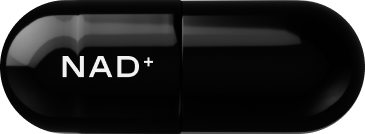

When it comes to longevity and cardiovascular health, most people focus on LDL/HDL cholesterol, blood pressure, or blood sugar. But there’s another marker quietly influencing your heart, brain, and blood vessels — one you might not hear about as often: homocysteine.
At Tally Health, we’re all about helping you understand the science of healthy aging — right down to the cellular level. Let’s explore what homocysteine is, why elevated homocysteine levels matter, and how nutrients like B vitamins (including folate) play a role in keeping them in check.
What Is Homocysteine?

Homocysteine is an amino acid — a natural byproduct created when your body breaks down another amino acid called methionine, which comes from protein-rich foods.
Under normal circumstances, homocysteine doesn’t linger in the bloodstream. It’s quickly recycled back into methionine or converted into another compound, cysteine, through a process known as the methionine cycle.
This conversion relies on several key nutrients — mainly vitamin B6, vitamin B12, and vitamin B9 (also known as folic acid, or folate). When these vitamins are in short supply, homocysteine metabolism slows down, allowing levels to build up in the blood.
Why Homocysteine Levels Matter
Having elevated homocysteine levels isn’t a disease itself — but it’s considered an important risk factor for several cardiovascular conditions, including:
Coronary artery disease
Blood vessel blockages
Heart attacks and blood clots
Other blood vessel disorders
High homocysteine may contribute to endothelial dysfunction — meaning the inner lining of your blood vessels becomes less able to carry oxygen-rich blood efficiently. Over time, this can increase heart disease risk and may also influence cognitive decline and brain aging.
What a Homocysteine Blood Test Measures

A homocysteine blood test (sometimes called a total homocysteine test) measures the amount of homocysteine circulating in your bloodstream.
Normal homocysteine levels generally fall below 15 micromoles per liter (µmol/L), though ranges may vary slightly between labs.
Elevated levels can result from low vitamin intake, thyroid disease, kidney disease, or even certain medical conditions that affect homocysteine metabolism.
If your test results show higher-than-normal values, your healthcare provider may recommend checking vitamin B12, folate, and B6 status — since deficiencies in these nutrients are among the most common causes of homocysteine imbalance.
Nutrients That Help Regulate Homocysteine

Lowering or balancing homocysteine levels often involves optimizing the nutrients your body needs to convert it efficiently:
Folic Acid (Vitamin B9): Helps with homocysteine remethylation, converting homocysteine back into methionine.
Vitamin B12: Works alongside folate in the enzyme methionine synthase to support normal homocysteine metabolism.
Vitamin B6: Assists in the conversion of homocysteine into cysteine through the transsulfuration pathway, which supports glutathione production — a key molecule for antioxidant defense and detoxification.
Betaine: Also known as trimethylglycine, supports homocysteine balance by donating methyl groups via the betaine-homocysteine methyltransferase pathway.
These nutrients act like a metabolic relay team, ensuring homocysteine is efficiently converted and doesn’t accumulate in the bloodstream.
Homocysteine, Longevity, and Cognitive Health

Emerging research suggests that high homocysteine levels may be linked not only to cardiovascular disease but also to Alzheimer’s disease and other forms of cognitive decline.
While more research is needed, supporting optimal homocysteine metabolism through B vitamins may play a role in maintaining long-term heart and brain health.
Supporting Healthy Homocysteine Levels

Lifestyle factors such as smoking, excess alcohol, poor diet, and low physical activity can all contribute to homocysteine elevation. Focusing on a nutrient-rich diet — especially one that includes leafy greens, eggs, fish, and legumes — can help maintain normal homocysteine levels naturally.
For additional support, consider Sharpen by Tally Health — formulated with science-backed ingredients (including B-vitamins) to help support healthy homocysteine levels and overall brain and cardiovascular function.
The Takeaway

Homocysteine may not be a household word, but it’s a key piece of the longevity puzzle.
By supporting healthy levels through good nutrition, lifestyle choices, and targeted supplements like Sharpen by Tally Health, you can help protect your heart, brain, and blood vessels — keeping your body strong, balanced, and energized for years to come.
References
Selhub. Homocysteine metabolism. Annu Rev Nutr 1999; https://doi.org/10.1146/annurev.nutr.19.1.217
Fan et al. Role of homocysteine in the development and progression of Parkinson's disease. Ann Clin Transl Neurol 2020; https://doi.org/10.1002/acn3.51227
Smith et al. Homocysteine and Dementia: An International Consensus Statement. J Alzheimers Dis 2018; https://doi.org/10.3233/jad-171042
Ostrakhovitch and Tabibzadeh. Homocysteine and age-associated disorders. Ageing Res Rev 2019; https://doi.org/10.1016/j.arr.2018.10.010
Smith and Refsum. Homocysteine - from disease biomarker to disease prevention. J Intern Med 2021; https://doi.org/10.1111/joim.13279
Refsum et al. Homocysteine and cardiovascular disease. Annu Rev Med 1998; https://doi.org/10.1146/annurev.med.49.1.31
What is homocysteine?
Homocysteine is an amino acid — a natural byproduct created when your body breaks down another amino acid called methionine, which comes from protein-rich foods. Under normal circumstances, homocysteine doesn’t linger in the bloodstream. It’s quickly recycled back into methionine or converted into another compound, cysteine, through a process known as the methionine cycle.
Why do high homocysteine levels matter?
Having elevated homocysteine levels isn’t a disease itself — but it’s considered an important risk factor for several cardiovascular conditions, including coronary artery disease, blood vessel blockages, heart attacks, and blood clots. High homocysteine may contribute to endothelial dysfunction — meaning the inner lining of your blood vessels becomes less able to carry oxygen-rich blood efficiently — which can increase heart disease risk and may also influence cognitive decline and brain aging.
How can you support healthy homocysteine levels?
Lifestyle factors such as smoking, excess alcohol, poor diet, and low physical activity can all contribute to homocysteine elevation. Focusing on a nutrient-rich diet — especially one that includes leafy greens, eggs, fish, and legumes — can help maintain normal homocysteine levels naturally. For additional support, consider Sharpen by Tally Health, formulated with science-backed ingredients (including B-vitamins) to help support healthy homocysteine levels and overall brain and cardiovascular function.











